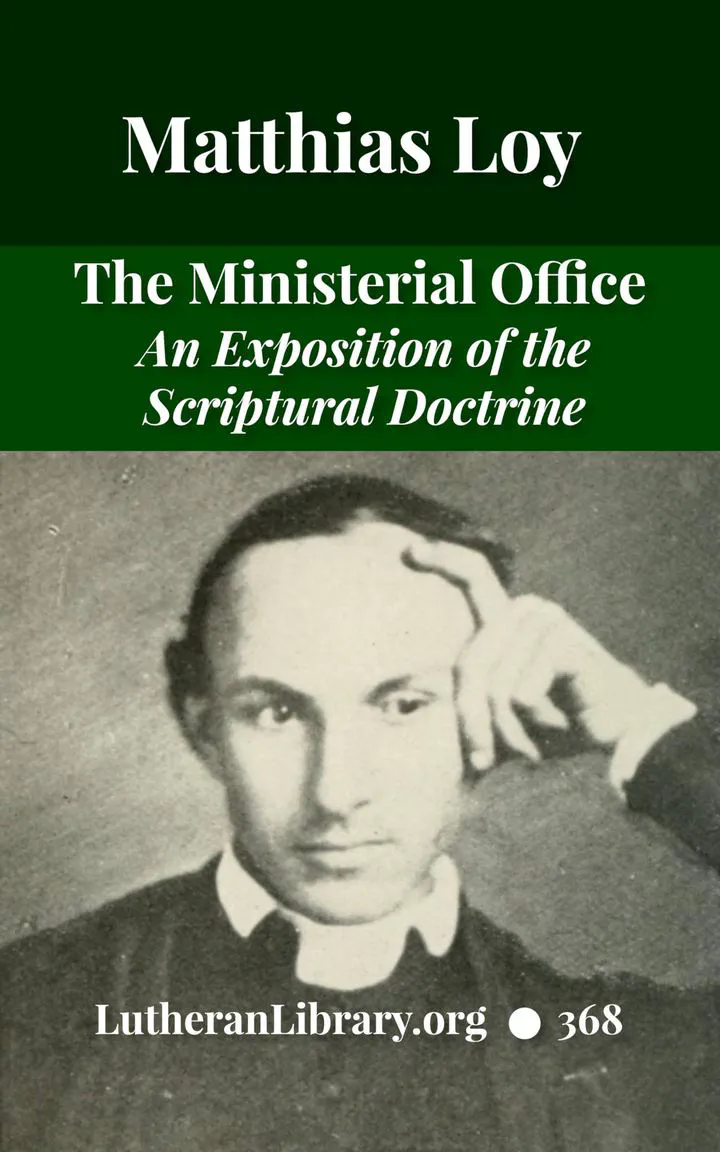The Ministerial Office by Matthias Loy

“The question of the Ministry is not one of indifference, which each individual, under the presumption that God has given no decision, may decide according to his own judgment and pleasure. The Lord has decided it in the Holy Scriptures, and to this decision we should meekly submit. It is hoped that those who will carefully consider the argument which is here offered, will not only be convinced that God has spoken on the subject in His word, and that the Church has believed and understood what He has revealed, and expressed her faith in her Confession, but also that they will not be in doubt as to what is the truth which is thus revealed and confessed. — Matthias Loy, from the Preface
Why Read This Book?
To understand clearly what the Bible says about the role of the Minister in the church, and to be nourished by the clear, evangelical writing.
About the Author
Matthias Loy (1828-1915) is a theological giant of American Lutheranism. He served as president of the Joint Synod of Ohio, the Columbus Seminary and Capital University, and edited the Lutheran Standard and the Columbus Theological Magazine. In 1881 he withdrew the Joint Synod from the Synodical Conference as a result of Walther’s teaching about predestination. Many of Matthias Loy’s books are available in Lutheran Library editions.
Book Contents
- Preface by Lutheran Librarian
- A Note about Typos [Typographical Errors]
- Preface
- Part 1. The Nature Of The Ministry
- 1 The Ministerial Work
- Salvation Ordinarily Dependent Upon Means of Grace
- Administration Of These The Necessary Work Of The Ministry
- 2 The Ministerial Workmen
- All Christians Called To Engage In The Work
- I. All Believers Are Priests
- II. All Believers Have The Keys
- III. Proof From Biblical Precepts And Examples
- IV. Errors Involved In The Denial Of Common Rights
- 3 The Ministerial Calling
- I. Existence Of A Special Ministerial Calling
- II. This Special Ministry A Public Office
- III. The Functions Performed In The Name Of The Church
- IV. The Office Instituted For The Sake Of Order
- V. The Activity In The Name Of All Is By Divine Appointment
- VI. The Public Office Distinct From The Universal Priesthood
- VII. The Office Not A Superior Order, But Simply A Ministry
- 1 The Ministerial Work
- Part 2. The Call To The Ministry
- 4 The Necessity Of The Call
- I. Direct Scripture Proof Of Such Necessity
- II. Indirect Proof
- III. Proof From The Confessions
- 5 The Call Given Through The Congregation
- I. Not Given Immediately
- II. Call Given Mediately Through Congregation
- 1 Church Has The Priesthood
- 2 Church Has The Keys
- 3 Divine Commands Imply This
- 4 Ministers Are Ministers Of The Church
- 5 Involved In The Practice Of The Apostles
- III. Refutation Of Conflicting Theories
- 6 The Call Limited In Place
- 1 From The Nature Of The Office
- 2 From Direct Testimony Of Scripture
- 3 Testimonies Of Lutheran Writers
- 7 The Call Not Limited In Time
- I. Proof That No Limitation In Time
- II. Call Not Incapable Of Being Revoked
- III. No Human Authority Can Prescribe Limits
- 4 The Necessity Of The Call
- Part 3. Ordination To The Ministry
- 8 Ordination Not Essential To The Ministry
- I. Ordination Not A Sacrament
- II. Word Of God Does Not Teach Its Necessity
- 1 No Divine Command For It
- 2 No Proof From Apostolic Authority
- 3 No Evidence In The Gifts Bestowed
- III. Doctrine Of Necessity Inconsistent With The Scripture
- IV. Symbols Of The Church In Conflict With Its Necessity
- V. Best Writers Of The Church Deny Its Necessity
- VI. Attempts To Invalidate Testimony Vain
- 9 Ordination A Confirmation Of The Call
- I. This Is The Doctrine Of The Scriptures
- II. This Is The Doctrine Of The Symbols
- III. This Is The Doctrine Of The Best Lutheran Authors
- 10 Ordination A Useful Rite
- I. Utility Of Ordination
- II. Church Teaches Its Utility
- 8 Ordination Not Essential To The Ministry
Publication Information
- Lutheran Library edition first published: 2020
- Copyright: CC BY 4.0